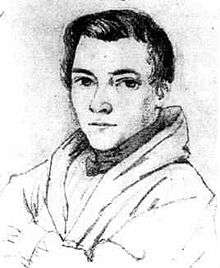Karl Wilhelm Feuerbach
| Karl Wilhelm Feuerbach | |
|---|---|
 Karl Wilhelm Feuerbach | |
| Born |
30 May 1800 Jena, Saxe-Weimar, Holy Roman Empire |
| Died |
12 March 1834 Erlangen, Germany |
| Nationality | German |
| Alma mater | Albert Ludwigs University of Freiburg |
| Known for | Feuerbach's theorem |
| Scientific career | |
| Fields | Mathematician |
| Institutions | University of Basel |
| Notes | |
|
Brother of Ludwig Andreas Feuerbach | |
Karl Wilhelm von Feuerbach (30 May 1800 – 12 March 1834) was a German geometer and the son of legal scholar Paul Johann Anselm Ritter von Feuerbach, and the brother of philosopher Ludwig Feuerbach. After receiving his doctorate at age 22, he became a professor of mathematics at the Gymnasium at Erlangen. In 1822 he wrote a small book on mathematics noted mainly for a theorem on the nine-point circle, which is now known as Feuerbach's theorem. In 1827 he introduced homogeneous coordinates, independently of Möbius.[1]
Works
- Eigenschaften einiger merkwürdigen Punkte des geradlinigen Dreiecks und mehrerer durch sie bestimmten Linien und Figuren. Eine analytisch-trigonometrische Abhandlung (Monograph ed.), Nürnberg: Wiessner, 1822 . online book at Google Books ("Properties of some special points in the plane of a triangle, MIYand various lines and figures determined by these points: an analytic-trigonometric treatment")
- Grundriss zu analytischen Untersuchungen der dreyeckigen Pyramide ("Foundations of the analytic theory of the triangular pyramid")
Notes
External links
- Works by or about Karl Wilhelm Feuerbach at Internet Archive
- O'Connor, John J.; Robertson, Edmund F., "Karl Wilhelm Feuerbach", MacTutor History of Mathematics archive, University of St Andrews .
- Feuerbach's Theorem: a Proof
- Karl Wilhelm Feuerbach: Geometer

This article is issued from
Wikipedia.
The text is licensed under Creative Commons - Attribution - Sharealike.
Additional terms may apply for the media files.